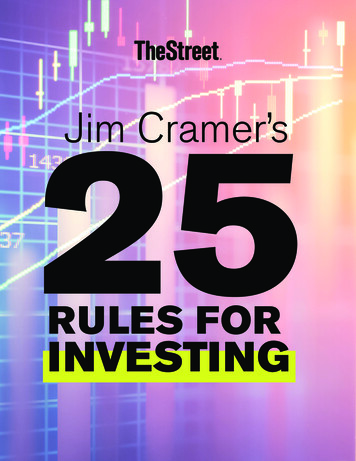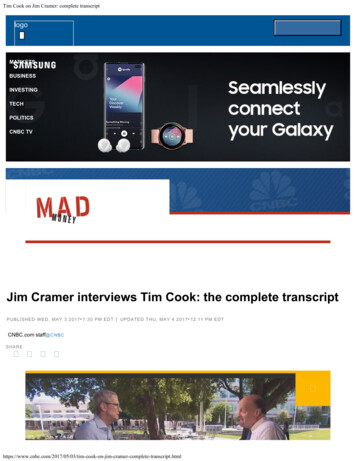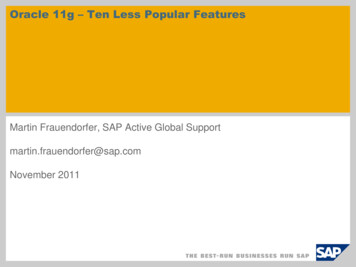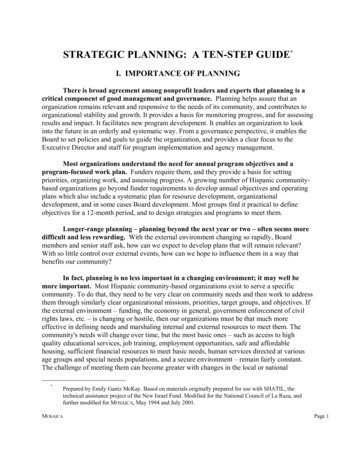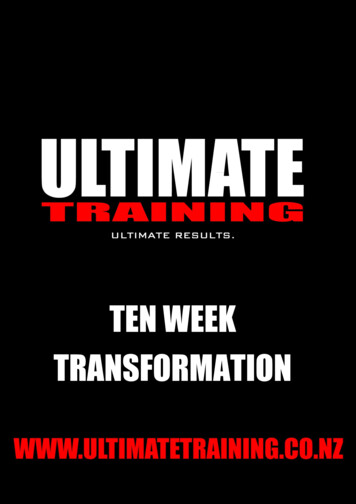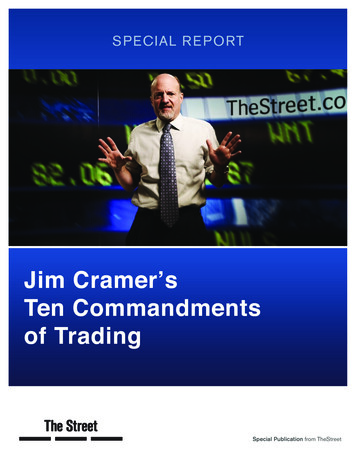
Transcription
Cramer’s Ten Commandments of TradingKeep It a TradeCommandment 1Never turn a trade into an investment.That’s the number-one commandment of trading, and yet, nomatter how many times I say it, no matter how many times Iscream it, people just don’t listen.When I came up with the Ten Commandments of Trading,which I detail in Jim Cramer’s Real Money, I did so after analyzing literally billions of dollars in losing trades. Remember, Iam a lab — no, I am the lab, because of the millions of tradesI have made in the last 25 years and my insanely rigorousmethod of analyzing any bad trade north of 5,000.The sheer magnitude of the sample alone made it worth mywhile. My tremendous masochistic streak made it doublyworth my while. I would analyze positive trades only when theygenerated 20,000 in profit, but anything that generated morethan 5,000 in losses got the microscope, big time.1ing to occur. The stock comes off no matter what after thatcatalyst.This is a brutal rule. It is so easily disobeyed that we seem todo so instinctively. But if you are like me and you sit there andare obsessed with the losses, you just don’t have time to keepdisobeying this rule. It’s just too darned damaging to yourpsyche in the long-term.Start the process today. You buying the Yahoo! for the quarter? After that quarter is reported, you skedaddle, no matterwhat.Promise?Random musings: If you like these commandments, my bookis full of them. All equally brutal. All taking advantage of mymyriad mistakes. Why let them happen to you?At the time of publication, Cramer was long Yahoo!.First Loss is BestThe commonality of many of those losses? They started out astrades, a stock bought for a specific event, a specific catalyst,and I turned them into investments, because I failed to wipethe trade off the books the moment it got busted. The biggerthe loss, the more I rationalized. I would buy the equivalentof a Research In Motion for the era in advance of the quarter.The results would come out, and I would say, “You know, I amreally in it not for the results but for the new Blackberry iteration, so let’s buy more.” I would dig in my heels. I was morelikely digging my grave.Or, I might say, “This time Alcoa’s got to get it right. I wouldput some on.” Then the quarter would come out and it wouldbe a stinker, but on the conference call management wouldsay how things were looking up in aerospace. Suddenly, itwould be an aerospace play! Buy more!How do you decide not to go down this path? By declaringright up front that the position is a trade and noting exactlywhy you are buying the stock and when the catalyst is go-View Our Premium ServicesCommandment 2Good trading, no matter what it’s based on, technicals, fundamentals, the stars, the news, requires a level of disciplinethat goes against human nature. We are taught in life to bepatient, to let things work out, not to be hasty, yet none of thatworks when it comes to trading. You have to be willing to cutand run, to use that “flight,” not fight, instinct that we supposedly are born with but suppress wholeheartedly when we aregrown up.That’s what the second commandment of trading is about, andthat’s why it is the second commandment of trading:Number 1Your first loss is your best loss.I genuinely believe that most trades need to work almost immediately for them to be right. I am willing to put a trade onand take it off immediately even if it doesn’t feel right. There’sa simple reason why that is so. When I trade, I try to trade for
Cramer’s Ten Commandments of Tradingpoints, or for at least a point. Less than that is too hard.But if I am willing to have a trade go more than a half of apoint against me, then it will be almost monumental to getback to even. So I like to stop myself out quickly.(Notice how different this all is from investing, where I expectthe stock to go “against” me and welcome it so I can improvemy basis.)So, let’s say that I bought Starbucks Wednesday because Ifigured the comp numbers would have improved. You haveto believe that wherever that stock trades after that numbercomes out and you have digested it, you are at risk to having avery big loss.2You can’t do the homework needed to learn Ultra Petroleum ifyou are keeping up with the Verizon and BellSouth spendingplans that could revitalize or trash JDS Uniphase.That’s why I always tell people that it’s OK to take the loss,especially if you already have it. The opportunity cost of staying with losers is always either misunderstood or chronicallyunderestimated by investors.Go through your portfolio. Kick out that AMR that’s beenhanging there all these years because you bought it muchhigher. Sell the Delta you picked up at 11 because youthought the asset too valuable to sell.So, you take that first loss. And you move on.And start learning new stories. That’s the way to make biggermoney than you are now.Rather than fight it.Trading Gains, Not Investment LossesCommandment 4That’s how you have to think, every day, about every trade.Take Your LossesCommandment 3When you mark something as a trade, you should not expectto make as much money on it as you would as an investment.A trade, like buying something into a quarter, is not about trying to make money over a long period of time.It’s OK to take a loss when you already have one.So many investors who call me on my radio or televisionshows have big losses on stocks. They stay in, though, because they genuinely believe that they don’t have a loss untilthey take it.Let’s take Apple Computer. I think that Apple’s a good tradeinto the quarter on Wednesday. I genuinely believe there isenough good news there that this 42 stock can ramp to 45.But if there isn’t?That, of course, is ridiculous. It’s another flaw of human nature,another flaw that hurts long-term performance.If we played with unlimited capital, it wouldn’t matter thatwe’re hanging on to Applied Materials because it once tradedat 30. We could keep our positions in Nortel and JDS Uniphase because, what the heck, they aren’t that much capital.But the investing process takes time, inclination and capitalthat most people don’t have. You can’t find the next SearsHoldings if you are stuck in EMC waiting for it to come back.View Our Premium ServicesI would be gone either way. I am not going to buy the stockfor the quarter and then, if it doesn’t work out, switch it intoNumber 1the investment file because I like the Tiger operating system’sprospects for next quarter, or because the iPod Shuffle’s areally cool gizmo.And, most important, if it works and the stock goes up thenext day, I am not going to say “You know what, this Apple’sone good long-term story. I am going to stick it out.”
Cramer’s Ten Commandments of TradingI can’t do that, because I had earmarked Apple for a trade before I started it. I can’t tell you how many times I have boughtsomething for a trade, had it go up and then held on to it onlyto lose the trading gain and come up with an investment loss.Hence my commandment:Never turn a trading gain into an investment loss.This year, in particular, I am talking to a lot of people whobought stocks for a trade and then ended up carrying themas a loss into the investment column. I recently spoke to oneinvestor who had bought Valero for a trade on gasoline prices,quickly picked up 7 points, and then rode it all the way back towhere he bought it because he decided he “liked” Valero.What does that mean?3are for waiters, to remind myself how stupid tips really are.Does it occur to you, on hearing the tip, that if the persontelling you that Nokia is going to buy RIM really knows that’sgoing to happen, the person is an insider and is breaking thelaw, and you could get in trouble, too? Does it occur to youthat if the person isn’t an insider, he doesn’t know? There simply is no way a tip like that can work. Leave it for the waiter.It gets more sinister. Most rumors start for a reason: Someone’s in a bad position. Instead of thinking, “Sure, Cisco isgoing to buy Nortel,” after you are given that particular tip, youshould be thinking “Man, is this guy wearing a ton of Norteland what won’t he do to get rid of it.”I know that cynicism isn’t a particularly positive attribute, butwhen it comes to tips, it sure is. Leave them for the waiter.You don’t like Valero; you like the profit Valero generated.Never confuse the two.Do Your Stock HomeworkOr you most certainly will give back the profit.The game’s tough right now. So tough that you have to bethinking, “It’s just not worth it. When 50,000 people close accounts at Ameritrade in a quarter, you have to know that youaren’t suffering your misery all by your lonesome.Tips Are for WaitersCommandment 5It’s pithy and the interviewers love it, so whenever I’m askedabout my new book, Jim Cramer’s Real Money, the fifth of myTen Commandments of Trading comes up:Tips are for waiters.“What does it mean, Jim?” they ask. Actually, it means thathuman nature and securities are a potent and devastating mix. People can whisper in your ear that Nokia is goingto buy Research In Motion, and you believe, you genuinelybelieve, because you want the big score. You know that thebest moves are takeovers and you are convinced that if youcan catch one, it will make up for all the bum steers and badbets you have made. Tips are winning lottery tickets in mostpeople’s eyes.That’s the reason I’ve had to default to a simple analogy, tipsView Our Premium ServicesCommandment 6It’s always that way when you are rooting for bad news. It’salways that way when you are playing defense.This is one of those moments when people are looking atsome rather huge gains in sectors that may be giving way andthey don’t want to ring the register.All of you in that situation, I want you to remember one of mymost important Trading Commandments:Number 1You don’t have a profit until you sell.The way this market looks right now, if you have a big gain inone of these heavy cyclical stocks, you need to think aboutwhether that gain is going to get wiped out or not.Let’s take Phelps Dodge. I genuinely feel that those whobought Phelps Dodge in the 60s and 70s believe that they
Cramer’s Ten Commandments of Tradingare so far away from where they bought the stock that theyhave the gain. You do not have the gain until you take it. Andsome needs to be taken.If we truly are in rotational hell — which I think we are, by theway — you have got to take some of the cyclical winnings offthe table, you just have to. Right now, right here.Stop thinking that you have it in the bank. Instead, put it in thebank. And accept the fact that the offense has made about allit can here and you have to be defensive to play the next movecorrectly.4right.Loss control there means that you don’t buy too much at onelevel so that you don’t find yourself under water big and thenhelpless as the stock rallies because you didn’t buy any stockat lower levels to trade around with.When I review portfolios, I constantly see those that arerocked by one position. In other words, someone let one badposition go against them and go against them and go againstthem some more. That’s because the person didn’t recognizethat you must be an activist about your losses; you must recognize them, remove them, contain them.Control Your LossesCommandment 7Losses do you in. They always do you in. Controlling losses isthe most important thing you can do. I don’t really care howyou do it. If it is to put on stops in trading, then so be it. If it isto decide that you are never going to let a position run a pointagainst you, then fine. But you must heed the seventh of my10 Commandments of Trading:Control losses; winners take care of themselves.If you do, you will be shocked at how often the good positionswill make you fortunes that don’t get taken away.Don’t Fear That You’ll Miss AnythingCommandment 8We always fear that we will miss the next move. We fear thatunless we act now, something is going to happen that isgoing to injure our finances permanently if we don’t make atrade.Let’s say you bought Apple for a trade. As soon as that number comes out, that’s the trade, for better or for worse. If youown it the next day, you are making an investment, and youdidn’t buy it for an investment. The loss must be taken.Those fears are wrong, and they’re the reason for my eighthcommandment of trading:It’s the same if you buy IBM today because you think it isdown too much. You have to stop yourself out at 79, or elsethat, too, becomes an investment, and an investment by default is a very vulnerable place.Sure, there are moments where the train genuinely feels like itis leaving the station without you. But you know what? I havebeen trading for 25 years, and believe me, there is always atrainbehind that last one.Number1What’s amazing about loss control is that it works in everyseason. Loss control would have saved you a fortune backin 2000. Loss control would have gotten you out of pharmamuch higher, only to get in now, when pharma’s finally right.The only time loss control doesn’t work is when you are picking a position as an investment to start. Then you are rootingfor the market and the stock to go down, so you can buy itView Our Premium ServicesDon’t fear missing anything.Two weeks ago, for example, it was impossible to stand on thesidelines and watch the oils go up without you. But the oilshad been moving up for 18 months; what you were witnessingwas more of a buying panic than anything logical. Now thesestocks are down huge and nobody wants them. If you fearedmissing the next move in oil, you might have bought then andno doubt are selling now.
Cramer’s Ten Commandments of TradingThat’s the reason this impulse must be controlled.We have seen it happen endlessly in tech over the last fewyears. One company would report a good number, say,Yahoo!, and the market would take up all other Net stockswithout thinking, including those of companies that Yahoo!was killing!That was the fear instinct at work again. Invariably, people whoacte
Cramer’s Ten Commandments of Trading nmer 1 2 nmer 3 nmer 4 nmer 5 nmer 6 ogo idt3 ogo idt2 ogo idt5 ogo idt5 ogo idt15 ogo idt1 View Our Premium Services 1 Keep It a Trade Commandment 1 Never .


